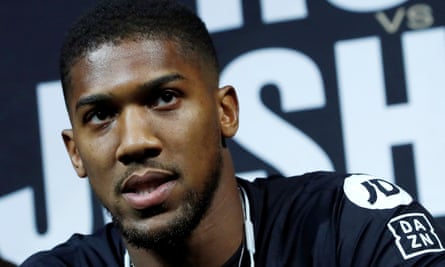Two scenes. Two British sporting icons. Variations on a theme. Scene one: a supremely jet-lagged Anthony Joshua in a Heathrow hotel in September. After several softballs about his rematch with Andy Ruiz Jr, the question finally comes. Why fight in Saudi Arabia when Amnesty International says the regime is using you to sportswash its “abysmal” human rights record that includes using public beheadings as a weapon to crush dissent?
“I appreciate them voicing an opinion,” replies Joshua, before stressing he is not a superhero who can zap away the world’s problems by donning a cape. When pressed, he mumbles something about “reforms” and then suggests he can use his relationship with the Saudis to ask difficult questions rather than “just accusing, pointing fingers and shouting from Great Britain”.
Scene two: Sebastian Coe in a sweaty press conference at the World Athletics Championships in Qatar a month later. Again human rights concerns are raised. But this time Lord Coe goes much further. Sport, he says, has a unique power to “shine the spotlight on issues” and is the “best diplomat we have”. “That is why sport will continue to work and sweat as hard as it does to make social change,” he continues, proselytising with the fervour of a true believer. “And organisations that are smart are actually partnering as they realise they can elicit that change.”
It’s a seductive premise, isn’t it? Sport as a sort of human-rights Heineken, somehow able to refresh and open up countries that traditional statecraft can’t reach. The reality does not match the rhetoric. Professor Simon Chadwick of the Salford Business school, who specialises in the geo-politics and marketing of sport, is blunt. “It is difficult to identify a country anywhere in the world that has fundamentally and sustainably changed for the better as a result of sport,” he says. Chadwick accepts there have been small improvements in some Gulf states: women being allowed into football matches in Saudi Arabia and Iran, for instance. “But without other, broader policy measures, it won’t bring about a massive shift in attitudes and behaviours,” he warns.
Even the small changes in workers’ rights for those working on 2022 football World Cup stadiums comes with a caveat. “These improvements are not necessarily being replicated in other industrial sectors across the country,” Chadwick says. “Qatar now has a twin-track labour market: one where standards are robust even by international standards and another where practices remain deeply suspect.” Nick McGeehan, a co-director of the human rights research organisation Fair/Square Research & Projects, is even more sceptical about sport’s power to improve human rights in repressive countries. “It’s a great line for sports administrators to trot out but the Gulf provides numerous examples of why the argument tends to be bogus and self-serving,” he says.

He cites the UAE, which has gone further than most regimes in using sport, as well as arts and literature festivals, to boost its image in the west. “Proponents say this will create space for free expression and improve the rights climate,” he says. “It hasn’t. On the contrary, there has been a drastic decline in the human-rights situation.” McGeehan argues the presence of golf’s European Tour, Formula One and ATP Tennis, along with Abu Dhabi’s ownership of Manchester City, “have provided it with cover and enabled it to present itself as liberal, western-friendly and open for business – everything Saudi Arabia now wants to do”.
Sport has extraordinary power to changes lives and challenge cultures. No one disputes that. It is helping people get more active, reducing violence between gangs, or even, or in the case of Football 4 Peace International, improving relations between Palestinian and Israeli children. But this sporting evangelism, which dates back at least as far as Thomas Hughes’ Christian socialism of the 19th century and is propagated most loudly by the International Olympic Committee and Fifa, can only stretch so far before it looks silly.
Bringing Formula One to Bahrain has not made the country substantially more liberal. Saudi Arabia, according to Amnesty, is in the midst of a “human-rights crackdown” despite its modernisation claims. China has become more authoritarian since the world’s eyes fixed on it during the 2008 Olympics. And while those who work in sport appear to believe the good-news stories they tell themselves, Chadwick notes when events are taken to such countries they merely “induce micro-changes within cultures rather than fundamentally make societal and macro-cultural change”.
Perhaps things will eventually shift. Chadwick notes there is often an internal feud between traditionalists and modernisers in Gulf states, with younger, western-educated elites more willing to embrace some reform. Whether such reforms would be enough for human rights groups is another matter. For now, though, we can say this with confidence. Holding sporting events in repressive regimes does far more to serve the political and economic interests of those in power – and swell the coffers of sporting bodies and athletes – than to improve the lot and lives of ordinary people.
That does not necessarily mean Joshua should not be fighting in Saudi Arabia, or the IAAF should not stage the world championships in Doha, but heads should not be buried in the sand either.

